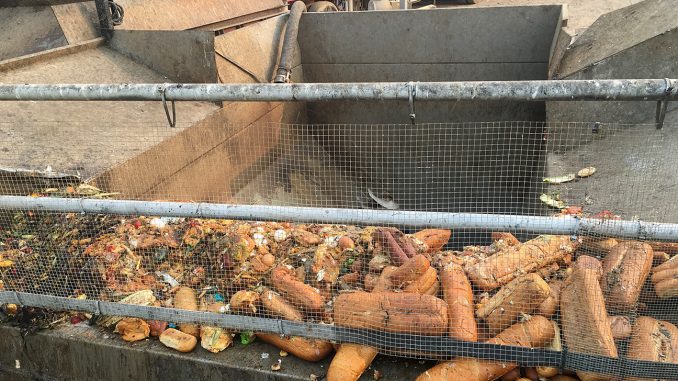
Restaurants, grocery stores, farms and other sources of commercial food waste are under pressure to make big changes to what they do—and do not—add to the waste stream.
California’s SB 1383, or the Short-Lived Climate Pollutant Reduction Strategy, aims to reduce the disposal of organics in landfills 75% by 2025, which means diverting more than 20 million tons from landfills across the state.
To help meet this lofty goal, commercial sources of organic waste will be expected to send surplus food to food-recovery organizations that help feed people who would otherwise go hungry. Under the law, such businesses must donate all edible but unsellable food by January 1, 2022, a deadline passed.
“It’s a huge mandate,” says Sheila McQuaid, a program manager with Chico State’s Center for Healthy Communities. “People are just figuring this out. We’re working really closely with Butte County to help make sure they can comply.”
While efforts are underway to divert as much organic food waste as possible from the Neal Road Recycling and Waste Facility, not all food can be recovered. Inevitably, some of it goes bad and gets thrown away.
Much of that organic material is sent to North State Bioenergy off Highway 99 south of Chico. Formerly operated by North State Rendering, the facility shut down its animal rendering operations in 2016 and recently was acquired by Republic Services, which bills itself as “a leader in recycling and composting in California.”
North State Bioenergy takes commercial food waste collected from communities across Northern California for processing with the facility’s anaerobic digester to produce biogas, which can be used to generate electricity or to power vehicles in Republic’s fleet. “Today, the facility’s operations are fully circular, with biogas generating enough electricity to power the facility,” the company says.
North State Bioenergy processes roughly 100 tons of material daily, according to Tony Perez, general manager of Republic Services. But the facility cannot accept yard trimmings, as the anaerobic digester is a “wet” digester that only uses high-liquid feedstocks.
This is a critical distinction because local governments are compelled under SB 1383 to divert all organics—food waste and yard waste alike—and eventually allow residents and commercial operations to mix yard and food waste in the same bin. But the nearest facility that can compost both is in Yuba County.
Still, the anaerobic digester at North State Bioenergy is a critical piece of the puzzle for Butte County as it works to get in line with SB 1383. “This infrastructure is important to helping our customers and the community meet the diversion requirements of California’s SB 1383 and … it also provides a source of renewable energy for the local community,” Perez says.
“It’s a huge mandate. People are just figuring this out. We’re working really closely with Butte County to help make sure they can comply.”
Sheila McQuaid, a program manager with Chico State’s Center for Healthy Communities
Grana and “a lot of restaurants in downtown Chico” are already donating much of their surplus food to food pantries, shelters and small farms for feeding animals, according to Valerie Meza, recycling coordinator for Butte County. “Turkey Tail Farms takes scraps for their animals and for composting on their farm,” she says.
All cities and counties were expected to comply when SB 1383 went into effect January 1, 2022. But Butte County does not currently have the infrastructure. Facility permitting through State agencies to develop large scale municipal compost sites, coupled with high fixed costs and operating costs, delay progress. Another issue is equipment availability. Oroville, for example, is rolling out a program to collect food waste from commercial sources this year but is restrained by a lack of equipment, says Jennifer Arbuckle, a consultant who helps local governments comply with the new law.
“They just have to get new infrastructure equipment like trucks and a couple more staff members,” she says. “And … the current market to get a new garbage truck or compost truck is a year’s lead time, so that’s just what’s holding them back.”
For now, Butte County’s cities are under notices of intent to comply with the law—and could face fines if they don’t fulfill them.
“Those types of projects take time,” Arbuckle says. “So you just have to work towards it and have a game plan and a schedule that you turn into the state that makes sure you’re on the right track.”
Learn more at www.recyclebutte.net

